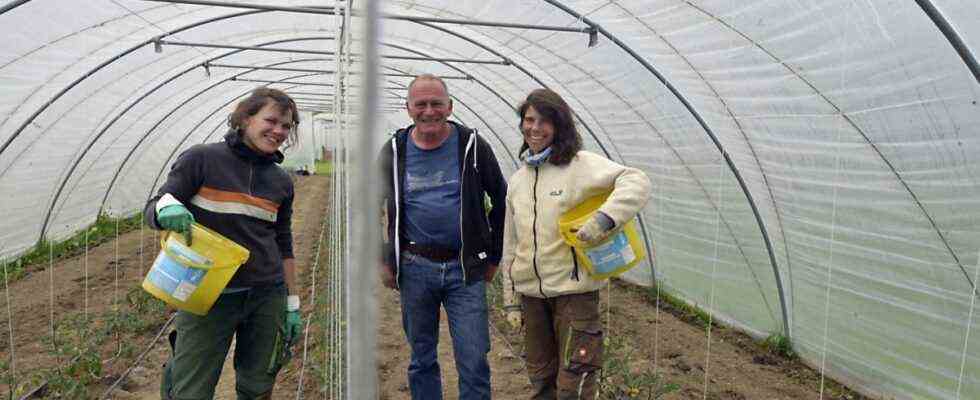His business “never went better,” says Siggi Fuchs. “The demand is so great that I can’t even meet it.” These sentences make you sit up and take notice, because the gardener is actually trying to explain why he is drawing a line under his solidarity-based agriculture called Waldgärtner in Höhenkirchen-Siegertsbrunn at the end of the year. There are now several farms such as gardeners who regularly deliver boxes of fresh organic vegetables to their customers in the region. An initiative was recently founded in the Isar valley.
But first back to the forest gardeners from Höhenkirchen: There are several reasons, says the 54-year-old about the imminent end, but one thing in particular was decisive: “I’ve worked too much for the last twelve years and now just have to step backwards” says Fuchs. “I never wanted to get that big either. But somehow the whole thing got out of hand.”
This is one of the reasons why it should be over soon: At the end of December, the approximately 180 households will move into their weekly vegetable crate from Höhenkirchen for the last time. Siggi Fuchs will not give up the nursery on Miesbacher Straße: He will continue to run a young plant market there and also dedicate himself to his passion – namely the cultivation of dozen and often old tomato varieties. “I would also like to create a herb garden,” says Fuchs. In general, his goal is: “No more mass production, but above all produce taste.”
Customers don’t buy, they share the harvest with one another
Siggi Fuchs was already interested in the taste of his vegetables more than 20 years ago, when the trained electrician and studied social worker made his first attempts at cultivation in a backyard in Munich’s Westend. In 2003 he created a forest garden near Allershausen – the name of his solidarity agriculture comes from that time. He founded this in 2009 as one of the first of its kind in Bavaria. The idea behind it: a group of consumers join forces with a gardener or a farmer and guarantee that food will be purchased regularly – in the case of the forest gardener, this was a weekly box of vegetables. At the same time, the members can take a look at the production at any time and help on site themselves – from cultivation to weeding to harvesting.
This kind of solidarity-based agriculture has experienced an upswing across Germany in recent years. A flagship is the potato combine, founded in 2012, which supplies 1,800 households in Munich and the surrounding area with fruit and vegetables and is organized as a cooperative. On the other hand, he himself was always a lone fighter, says Siggi Fuchs. In 2011 he leased a nursery in Johanniskirchen; two years later, areas in Höhenkirchen were added.
He moved his entire business there in 2015, which from then on supplied more and more people with organically grown vegetables. It was last 180 households, says Siggi Fuchs. Another 30 were on the waiting list. About half of the members live in the Westend, where you can pick up the vegetable box from two distribution stations, says Fuchs. In addition, more and more people from Siegertsbrunn and Höhenkirchen have been added in recent years.
From the New Year onwards, they will all have to source their vegetables from a different source. “Most of them were horrified when they heard that I was quitting,” says Siggi Fuchs. At least he had a little consolation for his members: “I offered them that they could still get my tomatoes for two months next year,” says the gardener. “And maybe there will be a couple of cucumbers or a salad or two with it.”
Next to Degerndorfer Straße between Münsing and Degerndorf is the field that was leased by the Isartal Solidarity Agricultural Cooperative. Vegetables are to be grown there from next spring.
(Photo: Harry Wolfsbauer)
In the Isar valley, on the other hand, a cooperative was recently founded that also operates environmentally and climate-friendly agriculture, but also wants to take into account the social aspect that it bears in its name: “SoLaWi Isartal”. Social agriculture should start as early as next spring. The goal is the weekly delivery of a large number of households in the Isar Valley – via distribution stations between Wolfratshausen and Pullach – with a fruit and vegetable crate, according to a press release from the cooperative, which the association Bürgererkraft Isartal eV founded together with a project group of the Pullach 2030 Agenda and who already have many committed citizens from Icking, Schäftlarn, Baierbrunn and Pullach by their side.
At an information event in the Catholic parish hall in Pullach, the cooperative recently presented details of the planned “agricultural turnaround from below”. The interested people learned that the new and exciting thing about solidarity agriculture projects is that vegetables are not bought, but shared. “And that applies to both good and bad harvests,” as a founding member of the cooperative emphasizes. Producers of the food as well as their buyers formed a close community beyond the usual market events of supply and demand, writes the cooperative. In practice, this means that the full risk of bad harvests is not borne by the manufacturer alone, as is usual in our market economy, which is an important detail in times of rapid climate change. In contrast to other providers of eco-boxes, the gardeners do not have to worry about their income, they are employed on a permanent basis and, according to the initiators, receive “a decent payment”.
Anyone who would like to find out more about the project, support it as a sponsoring member, purchase a vegetable box or actively participate in vegetable cultivation can visit the website https://solawi-isartal.de/kontakt/ or by phone on 01525/786 57 92.

